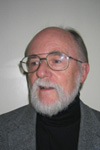Utilization-Focused Evaluation Workshop
Utilization-Focused Evaluation Workshop
Instructor: Michael Quinn Patton, Ph.D.
Founder & Director, Utilization-Focused Evaluation
and independent evaluation consultant
Saturday, October 1, 2011 | 8:30 a.m. - 4:30 p.m.
Price: $125 for NOSC attendees and MAE Members; $150 for others
View information on venue and directions
Utilization-Focused Evaluation begins with the premise that evaluations should be judged by their utility and actual use; therefore, evaluators should facilitate the evaluation process and design any evaluation with careful consideration of how everything that is done, from beginning to end, will affect use. Use concerns how real people in the real world apply evaluation findings and experience the evaluation process. Therefore, the focus in utilization-focused evaluation is on intended use by intended users.
Utilization-focused evaluation is a process for helping primary intended users select the most appropriate content, model, methods, theory, and uses for their particular situation. Situational responsiveness guides the interactive process between evaluator and primary intended users. A psychology of use undergirds and informs utilization-focused evaluation: intended users are more likely to use evaluations if they understand and feel ownership of the evaluation process and findings; they are more likely to understand and feel ownership if they've been actively involved; by actively involving primary intended users, the evaluator is training users in use, preparing the groundwork for use, and reinforcing the intended utility of the evaluation every step along the way.
Participants will learn:
- Key factors in doing useful evaluations, common barriers to use, and how to overcome those barriers.
- Implications of focusing an evaluation on intended use by intended users.
- Options for evaluation design and methods based on situational responsiveness, adaptability and creativity.
- Ways of building evaluation into the programming process to increase use.
Biography

Michael Patton is an independent organizational development and evaluation consultant. He is former President of the American Evaluation Association. He has received both the Alva and Gunnar Myrdal Award for "outstanding contributions to evaluation use and practice" and the Paul F. Lazarsfeld Award for lifetime contributions to evaluation theory from the American Evaluation Association.
He is the author of several evaluation books including a 4th edition of Utilization-Focused Evaluation (2008) and 3rd edition of Qualitative Research and Evaluation Methods (2002). These books have been used in over 500 universities worldwide. He is also author of Creative Evaluation (1987); Practical Evaluation (1982); and Culture and Evaluation (1985). He has co-authored a book on the dynamics of social innovation with two Canadians, drawing on complexity theory and systems thinking—Getting to Maybe: How the World is Changed (Random House, 2006). His latest book is Developmental Evaluation: Applying Complexity Concepts to Enhance Innovation and Use (Guilford Press, 2010).
Patton was the keynote presenter for the launching of the Latin American Network in Peru in 2004, the African Evaluation Society in Nairobi, Kenya in 1999 and the European Evaluation Society in Switzerland in 2000. He has twice keynoted the American, Canadian, and Australasian Evaluation Society conferences, as well as national evaluation conferences for the United Kingdom, New Zealand, Italy, Denmark, Japan, and Brazil. He is a regular trainer for the International Program in Development Evaluation Training sponsored by The World Bank in Ottawa each summer, the American Evaluation Association's professional development courses, and The Evaluators' Institute. He is currently conducting a meta-evaluation of the evaluation of the Paris Declaration on increasing aid effectiveness.
